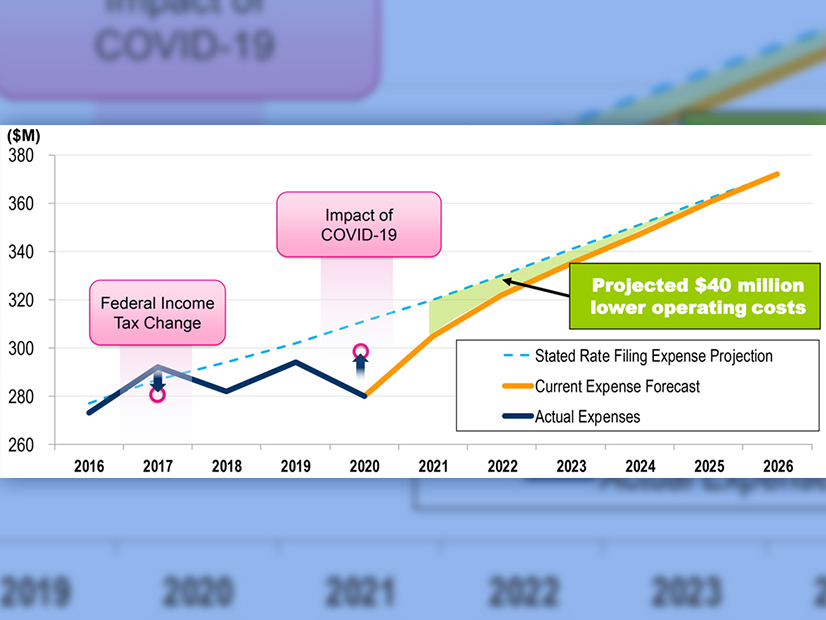
FERC ordered hearing and settlement judge procedures on Wednesday in response to industrial customers’ protest of PJM’s proposed revisions to its administrative rates (ER22-26).
The commission accepted PJM’s proposed tariff revisions for filing and suspended them for a “nominal period” to become effective Jan. 1 while directing the appointment of a settlement judge within 45 days and the issuance of a report on the status of the settlement discussions 60 days after that.
FERC said its initial analysis found PJM’s proposed tariff revisions may be unjust and unreasonable.
PJM’s proposal called for changing its administrative cost recovery from the current practice of initial charges at stated rate levels with a varying quarterly refund to the new practice of monthly rates based on that month’s costs and that month’s billing determinations.
The RTO said the proposal was developed in conjunction with the Finance Committee and is “specific only” to schedule 9 of the tariff, which provides cost recovery for its subsidiary, PJM Settlement, Inc. The company provides billing, settlement, treasury and credit management functions for transactions in the PJM markets. Other schedules recover costs for FERC’s annual charges, the Independent Market Monitor and other entities that benefit the PJM region.
The schedule 9 changes received unanimous support from the Finance Committee in July. PJM said the administrative rate review was initiated to examine “rate equity” across its membership to avoid cross subsidization among the different customer classes and for “overall revenue adequacy.”
The proposal “adjusts with changes in usage patterns” of the services that PJM provides and the costs of providing the services; it was designed to avoid over- and under-collection of funds to finance the RTO.
Stakeholders endorsed the proposal and tariff revisions at the September Members Committee meeting. The proposal was endorsed with a sector-weighted vote of 3.84 (76.8%), and PJM made a filing with the commission on Oct. 1. (See “PJM Administrative Rates,” PJM MRC Briefs: Sept. 29, 2021.)
Disagreements
The PJM Industrial Customer Coalition (ICC) protested PJM’s filing, arguing that the proposal was “not supported by any quantitative analysis or evidentiary support, such as a cost-of-service study.” The ICC said PJM did not provide any explanation for using the number of invoices as the new billing determinant for schedule 9, and that for industrial customers that have multiple accounts for multiple facilities in PJM, the “cost implications of the per invoice weekly charge is substantial.”
The ICC said one of its members will see costs increase by 385%, while PJM “has not demonstrated that the cost to serve industrial customers with multiple accounts/invoices has uniformly increased by that kind of magnitude.”
PJM said the “vast majority” of settlement costs are fixed expenses, “reflecting the resources PJM Settlement must secure to conduct its activities.” The RTO said “more than half” of the ICC members were charged “little or nothing” under the current system.
FERC said it needed fact finding to determine “whether PJM has justified its proposal to show that its per invoice approach comports with cost causation principles.”
FERC Commissioner Allison Clements partially dissented to the order, saying she would have also set a hearing on whether PJM’s cost transparency procedures are sufficient.
“Having previously participated in different RTO stakeholder processes, I appreciate the value of clarity in procedures related to ensuring transparency,” Clements said in her dissent. “I am not convinced based on the record compiled to-date that the procedures outlined by PJM will prove adequate.”
PJM last filed to update its administrative rates five years ago. In December 2016, FERC accepted PJM’s proposal to increase its stated rates over an eight-year period, with a 7.5% increase in 2017 and a 2.5% hike annually between 2019 and 2024.
The RTO said it required the rate increase at that time because its stated-rate revenues had fallen below the level needed to recover its administrative costs.


